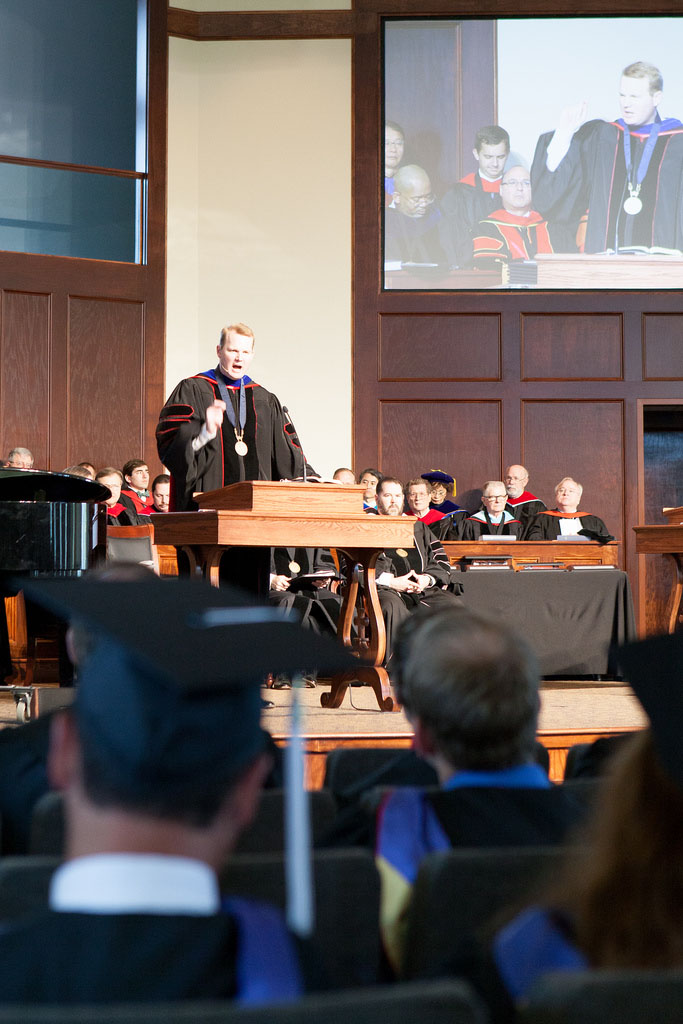
KANSAS CITY, Mo. (BP) — Presiding at spring commencement exercises, Midwestern Baptist Theological Seminary President Jason K. Allen brought a word of encouragement from the Great Commission in Matthew 28:16-20.
Allen reminded the graduates and guests of the calling and mission of the seminary:
“We exist for the church. But to exist for the church means ultimately you exist unto the same end the church exists: for the gathering in of the nations for the glory of Christ and for the proclamation of the Gospel to all people.”
A full chapel audience of faculty, family and friends watched 80-plus undergraduate, graduate and doctoral students cross the stage to receive their diplomas.
Allen, in his commencement address, “Why You Are Here & Why You Now Must Go,” noted that the questions of “Who am I?” “Why am I here?” and “Where must I go?” are incredibly relevant to the graduates.
“I say to you, if you are in Christ, you have been adopted into His family, you have been called out of the world to serve Him and you have a double calling on your life to serve as a pastor, a teacher, an evangelist in His church,” Allen said. “Your identity, if authentically represented by your presence and sense of call today, is fixed by Him.”
Working through the text of Matthew 28, Allen spoke to those watching the graduates.
“There is joy in seeing them graduate. But there is also joy in seeing them go,” Allen said. “We are not in the business of accumulating people and seeing how long we can keep them here. We’re in the business of graduating people and seeing them go and seeing them serve the cause of Christ wherever that call may lead.”
Allen spoke of the world’s nearly 3,000 unreached people groups, a number that at first seems daunting, but one that Allen believes can be erased.
“In this generation we can see in a very real way the eradication of what’s known as an ‘unreached people group,'” he said, calling the graduates to be a part of that change and to leave the seminary with that holy calling on their hearts.
Allen also encouraged them to remember their ultimate authority as they go forth into churches and into the world.
“Your ultimate report is not to a personnel committee or to an elder board or a deacon board, though God uses those things,” he said. “Your ultimate accountability is to the Word of God, the Spirit of God by which Christ mediates His authority and rule over His servants.
“You go forth to serve as one under a charge. Your ministry is not your own, your message is not to be your own, and that which you seek to undertake is not what you craft on paper [as] what looks to be the easiest or most successful ministry course,” Allen said. “But rather, you have a pre-committed end to your life — the end to which Christ is calling you to.”
Speaking to Midwestern’s vision and calling, Allen said the call of the seminary is to train up pastors, teachers and missionaries who will go. He exhorted the graduates to go forth boldly, settling in their hearts that with Christ as their ultimate authority, there is nothing that man can do to them.
“If you haven’t settled in your heart that you are a man or woman under authority, I fear for your ministry. I fear for you,” Allen said. “But if you have settled in your heart that this is God’s Word and it is true and that you are a man or woman under authority, then what can someone do? They can do a lot, but ultimately they can do nothing to you of eternal consequence.”
Pointing to Jesus’ words in Matthew 28, verse 20, that Jesus will be with His followers always, Allen said that phrase “brings to us a promise to cling to, a promise that Jesus is not tossing you out today as we ‘toss you out.’ He is not sending you out alone as we, in a sense, are sending you alone. Jesus is saying to His church and to those who are seeking to undertake His Great Commission: ‘I am with you always.'”
–30–
Tim Sweetman is director of communications at Midwestern Baptist Theological Seminary.

















